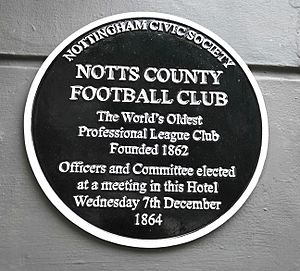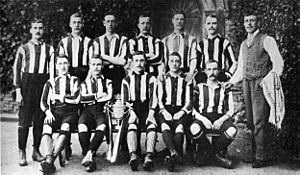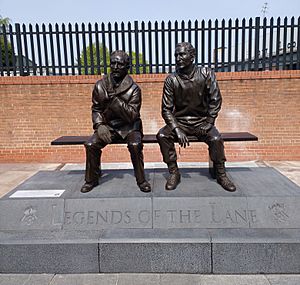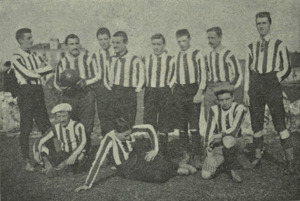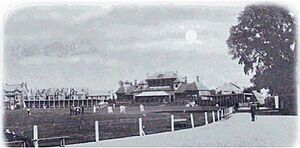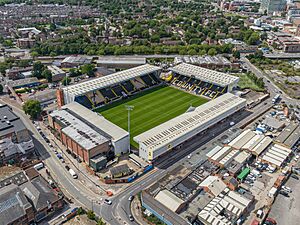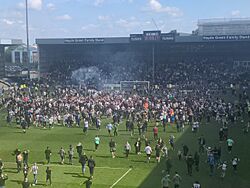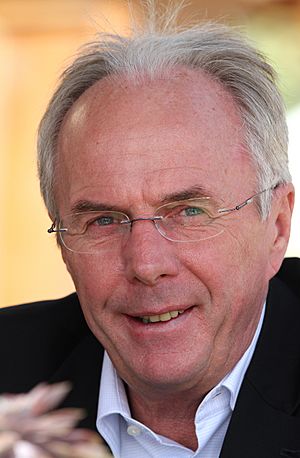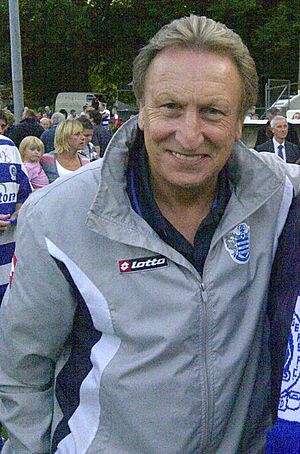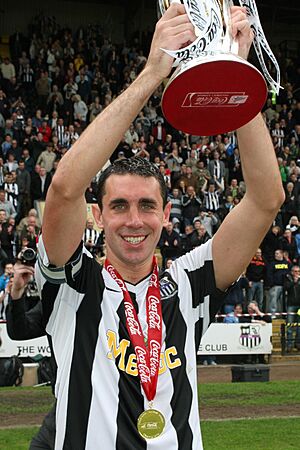Notts County F.C. facts for kids
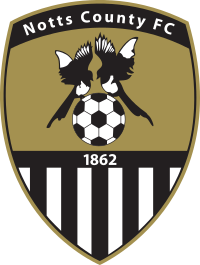 |
||||
| Full name | Notts County Football Club | |||
|---|---|---|---|---|
| Nickname(s) | The Magpies | |||
| Short name | Notts | |||
| Founded | 1862 | |||
| Ground | Meadow Lane | |||
| Capacity | 19,841 | |||
| Coordinates | 52°56′33″N 1°8′14″W / 52.94250°N 1.13722°W | |||
| Owner | Alexander and Christoffer Reedtz | |||
| Chairman | Christoffer Reedtz | |||
| Head coach | Martin Paterson | |||
| League | National League | |||
| 2018–19 | League Two, 23rd of 24 (relegated) | |||
|
||||
Notts County Football Club is a professional football team from Nottingham, England. They play in EFL League Two, which is the fourth level of English football. Notts County earned their spot in League Two after being promoted from the National League in the 2022–23 season.
The club was started in 1862, making Notts County the oldest professional football club in the world! They first played in the FA Cup in 1877. In 1888, they became one of the first twelve teams to form the Football League. Notts County has moved up (promoted) and down (relegated) through different leagues many times. They have played in all of the top five divisions of English football.
Notts County won the FA Cup in 1894. Their best league finishes were third place in 1890–91 and 1900–01. In 1947, a famous player named Tommy Lawton joined the team, bringing huge crowds. After he left, the club struggled and was in the Fourth Division by the 1960s. Under manager Jimmy Sirrel, they moved up three times in the 1970s and 1980s, reaching the top division in 1981. Their last season in the top division was 1991–92, led by manager Neil Warnock.
In the early 2000s, Notts County faced serious problems off the field. This led to them being relegated from the Football League in 2019. They spent four years playing outside the main leagues before returning in 2023. The team has played their home games at Meadow Lane since 1910. Before that, they played at places like Trent Bridge. The club's black and white colours were chosen in 1890, which gave them their nickname, "The Magpies." In 1901, Notts County even lent their colours to the famous Italian club Juventus. Notts County first played their local rivals, Nottingham Forest, in 1866. This makes the Nottingham derby one of the oldest football matches. The player with the most games for the club is goalkeeper Albert Iremonger, who played 601 matches. The top goal scorer is Les Bradd with 137 goals.
Contents
Club History
How Notts County Started
Notts County officially started on December 7, 1864, but their history goes back to 1862. Around that time, the people who founded the club would meet in The Park in Nottingham to play football together. These early games are seen as the club's beginning. Notts County played their first recorded match on December 8, 1864, against a team called Trent Valley.
On January 2, 1865, Notts County played Sheffield, which was Sheffield's first game against a team from outside their city. Many of the early club members came from middle-class families, including bankers and lawyers.
Early Years and FA Cup Success
In 1872, Harwood Greenhalgh played for England in the first international match against Scotland. He was Notts County's first player to play for his country. The club first entered the FA Cup in the 1877–78 season. They reached the semi-finals in 1883 and 1884. During this time, Harry Cursham played for Notts County. His 49 FA Cup goals are still a record for the competition.
In 1885, football became professional, and Notts County quickly signed six professional players. In 1888, Notts County became one of the 12 founding members of the Football League.
In 1891, Notts County reached the FA Cup final for the first time but lost to Blackburn. In 1893, they were relegated for the first time. However, in 1894, they made history by becoming the first team from the Second Division to win the FA Cup! They beat Bolton Wanderers 4–1 in the final. Jimmy Logan scored three goals in that match. Notts County won the Second Division championship in 1896–97 and were promoted to the First Division. They spent most of the next 19 seasons in the top league.
After the Wars and Lawton's Impact
Football stopped for most of World War I. When it started again in 1919–20, Notts County was relegated to the Second Division. In 1922–23, they won the Second Division championship and returned to the First Division. They stayed there for three seasons. In 1930, they were relegated to the third division for the first time. But they quickly won promotion back to the Second Division in 1930–31. During this season, Tom Keetley scored 39 league goals, a club record for 92 years.
By 1935, Notts County was back in the Third Division South. After World War II, in 1947, Notts County paid a record £20,000 to sign England international player Tommy Lawton. Lawton's arrival brought huge crowds to Notts County games. A match against Swansea Town in 1947 had 45,116 fans, with about 10,000 more outside! Lawton and Jackie Sewell formed a great scoring team. Notts County won the Third Division South title in the 1949–50 season. They secured the championship with a 2–0 win over Nottingham Forest in front of 46,000 fans.
After Lawton and Sewell left, Notts County spent most of the 1950s in the Second Division. They were relegated twice in a row in 1958 and 1959, dropping into the Fourth Division for the first time. They were promoted back up the next year.
The Sirrel and Warnock Eras
In 1969, Jimmy Sirrel became manager. He had great players like Les Bradd, who became the club's top goal scorer, and Don Masson. In 1970–71, Notts County won the Fourth Division championship. They had a fantastic season, not losing a single home game. They were promoted to the Second Division in 1972–73.
Sirrel returned as manager in 1977. In 1980–81, Notts County finished second in the Second Division, earning promotion to the First Division after 55 years! They surprised everyone by finishing 15th in the top league, avoiding relegation. However, they were relegated back to the Second Division in 1984. Sirrel stayed until 1987.
In 1989, Neil Warnock became manager. In his first full season, 1989–90, he led Notts County to promotion to the Second Division by winning the play-off final at Wembley Stadium. A year later, they returned to Wembley and won promotion again, reaching the First Division for two years in a row! Notts County's time in the First Division was short, and they were relegated in 1991–92. This meant they just missed out on being in the first season of the Premier League.
Recent Times
Warnock left in 1993. Notts County was relegated to the Second Division (which was then the third tier) in 1995. They also won the Anglo-Italian Cup that year. After another relegation, they were in the Third Division (now League Two) in 1997. Under manager Sam Allardyce, Notts County won the Third Division championship in 1997–98, setting several club records.
In the early 2000s, Notts County faced many serious problems with their owners and money. Between 2002 and 2003, the club was in a difficult financial situation for a very long time. They avoided going out of business but were relegated to the fourth tier (League Two) in 2004.
In 2009, a group called Munto Finance took over the club. They claimed to be very rich and even brought in former England manager Sven-Göran Eriksson as a director. However, it turned out to be a scam, and the club was in danger of closing down. Luckily, Ray Trew took over, saving the club. The 2009–10 season ended well, with Notts County winning the League Two championship! They stayed in League One for five seasons before being relegated back to League Two in 2015.
In 2019, Notts County was relegated from the Football League for the first time in their long history. This was a very sad moment for the club. However, Christoffer and Alexander Reedtz bought the club in July 2019. Notts County lost the 2020 National League play-off final. They remained in the National League for three more years. In the 2022–23 season, Notts County had an amazing year, earning 107 points. This was a record for a team finishing second, as Wrexham finished just ahead of them. Notts County finally won promotion back to League Two by winning the play-offs, beating Chesterfield in a thrilling penalty shootout at Wembley Stadium.
Club Identity
Team Name and Nicknames
When the club was officially formed in 1864, they decided on "Notts Foot Ball Club." "Notts" is a short way of saying Nottinghamshire. Over time, the name "Notts County" became popular to help tell them apart from other local teams. Notts County is the only English club with an abbreviation in its official name.
Before they were known as the "Magpies," Notts County was sometimes called the "Lambs." After they started wearing black and white striped shirts in 1890, they quickly got the nickname "Magpies." This nickname stuck because magpies are black and white birds.
Team Colours and Kits
In their very early days, Notts County wore blue caps or orange and black hoops. In 1880, they wore chocolate and blue shirts. But in 1890, they switched to black and white striped shirts. Except for one season in 1934–35, black and white have been the club's colours ever since.
At the end of 1901, the Italian club Juventus wanted new shirts. An English player on their team, John Savage, who supported Notts County, arranged for a friend in England to send black and white kits to Italy. Juventus has played in black and white stripes ever since! In 2011, Juventus invited Notts County to be their first opponents at their new stadium to celebrate this special connection.
Club Badge
A club badge first appeared on Notts County's shirts in 1923. It showed a magpie. This badge was used until 1926. From 1948, a large black shield with "NCFC" was on the shirts. In 1950, a new badge with a magpie on a football was used. However, the team started playing poorly, and the chairman thought the magpie was bad luck, so he had it removed! The team won their next game, and the magpie badge didn't return for a while.
A badge based on Nottingham's coat of arms was used from 1962. A magpie finally reappeared on the shirts in 1977. Since 1986, the badge has usually featured two magpies, with the current design adopted in 2010.
Home Grounds
Early Playing Fields
Before the club was officially formed, the founding members would meet at Park Hollow in The Park, Nottingham, to practice football. By 1863, these meetings moved to the Meadows Cricket Ground, where the club's first official matches were played. The Meadows was their main home until 1877. They sometimes played important games at Trent Bridge. Between 1878 and 1880, they played games at the Meadows, Trent Bridge, and Beeston. In 1880, Notts County moved to the Castle Ground, staying there until 1883.
Playing at Trent Bridge
Notts County moved to Trent Bridge in 1883. Football was played on one side of the ground. The facilities were simple at first. Notts County's record attendance at Trent Bridge was 25,000 fans for an FA Cup game in 1907 and a league match in 1908.
Cricket was the main sport at Trent Bridge, so Notts County had to play some games at other grounds, especially at the start and end of the season. They used the Meadows and Castle Ground, and later, Forest's grounds. In 1908, the owners of Trent Bridge decided not to let the football club use the ground anymore, giving them two years to find a new home.
Meadow Lane Stadium
Notts County leased land on Meadow Lane in 1910 and quickly built a new stadium. It opened on September 3, 1910, with a game against Forest that ended 1–1, watched by 27,000 fans. In 1941, during World War II, the stadium was badly damaged by bombs. In 1949, the "Spion Kop" end of the ground was made taller to hold more fans.
Major rebuilding work happened in the 1990s to make Meadow Lane an all-seater stadium. Three stands were rebuilt in one summer in 1992. The main stand was replaced in 1994. In 2019, the stadium could hold 19,841 fans for football matches. In the 2023–24 season, the average attendance was 10,905, which was the third highest in League Two.
Fans and Rivalries
Notts County fans are known for singing the "Wheelbarrow Song" to the tune of "On Top of Old Smokey". The lyrics are "I had a wheelbarrow, the wheel fell off." In 1981, fans made a record to celebrate the team's promotion.
Notts County first played their neighbours Nottingham Forest in March 1866. This makes the Nottingham derby one of the oldest football matches ever. The two teams have played each other 94 times in league and cup games. Notts County has won 30 times, Forest 39, and there have been 25 draws. These matches are rare now because the clubs have not been in the same league often since 1957. Their last game was a League Cup match in 2011. Notts County also has a local rivalry with Mansfield Town.
Club Records and Statistics

Goalkeeper Albert Iremonger holds the record for most appearances for Notts County, playing 601 matches between 1904 and 1926. A road near the stadium is named after him. Les Bradd is the club's all-time leading goal scorer with 137 goals. The record for most goals in a single season is held by Macaulay Langstaff, who scored 42 goals in 2022–23.
Notts County's biggest win was 15–0 against Rotherham Town in an FA Cup game in 1885. Their biggest league win is by ten goals, achieved twice. The 2022–23 team broke several club records. They earned 107 points and won 32 league matches, which were new records. They also scored 117 league goals and went unbeaten for 25 league matches.
Notts County's record home attendance was 47,310 fans for an FA Cup game against York City in 1955. The record for a league game was 46,000 against Forest in 1950. The 1949–50 season also had a record average crowd of 35,176 fans. Notts County also holds the record attendance for a National League game, with 16,511 fans watching a match in 2022. The largest crowd Notts County has ever played in front of was 61,003 fans at Anfield against Liverpool in 1949.
Notts County has been promoted 14 times and relegated 17 times. They have played in all five top divisions of English football. They were founding members of the Football League (first tier) in 1888. Their highest league finish is third place, achieved in 1890–91 and 1900–01. In October 2023, Notts County played their 5,000th Football League match, becoming the eighth club to reach this milestone.
Club Ownership and Money Matters
Notts County became a company in 1890. After a good season in 1890–91, the club faced financial difficulties due to falling attendance and higher player salaries. When they were relegated in 1893, the chairman and directors resigned. However, their financial situation improved after winning the FA Cup in 1894.
In 1928, the club's finances were described as "the worst in the club's history." A new company was formed, but it struggled. In 1966, the club was almost shut down, but an investment of £10,000 saved them. In 1968, Jack Dunnett, a local politician, became chairman.
By 1986, Notts County had a large debt. A meeting was held with 1,500 supporters to find a solution. This led to the launch of Lifeline, a scheme that still raises money for the club today. Derek Pavis became chairman in 1987. During his time, the club sold players for large fees and Meadow Lane was greatly improved. Pavis left in 2000.
In the early 2000s, Notts County faced more financial problems and was placed into administration. This means the club was managed by experts to try and save it from bankruptcy. A fan, Haydn Green, helped finance a takeover, and the Notts County Supporters' Trust also gained a say in how the club was run.
In 2009, the Supporters' Trust handed control to Munto Finance, who claimed to be a rich group. They even brought in Sven-Göran Eriksson as director of football. The club spent a lot of money, signing players like Kasper Schmeichel and Sol Campbell. However, it turned out the takeover was a fraud, and the promised money didn't exist. The club was again in danger of closing.
Ray Trew then took over, saving the club from bankruptcy. Eriksson left, giving up money the club owed him. Trew remained chairman until 2016. The club faced more financial issues and unpaid taxes. Finally, Christoffer and Alexander Reedtz bought the club in July 2019. Under their ownership, attendance has increased, and new projects like "The Nest" (a fan zone) have been completed.
Notts County in the Media
In 1959, Colin Slater began reporting on Notts County for the Nottingham Evening News. He became the club's reporter for BBC Radio Nottingham in 1968. He reported on or commentated on over 2,500 matches before retiring in 2017. Slater was known as "the voice of Notts County." He passed away in 2022. Before his funeral, his funeral procession visited Meadow Lane, where Notts County supporters gave him a guard of honour.
In 2002, the BBC showed Paradise Heights, a TV show set in Nottingham. A character played by Ralph Little was a Notts County fan and sang the "Wheelbarrow Song." In 2003, journalist David McVay wrote a book about his time as a Notts County player in the 1970s. In 2012, a play based on McVay's book was performed at the Nottingham Playhouse.
During the 2022–23 season, Notts County was in a very close race with Wrexham for promotion from the National League. Because of this, Notts County was featured in the FX television show Welcome to Wrexham. This show documents actors Ryan Reynolds and Rob McElhenney's ownership of Wrexham.
Players
Current Squad
|
|
Players on Loan
|
Famous Former Players
Coaching Staff
- Head Coach: Martin Paterson
- Assistant Head Coach: Andy Edwards
- Assistant Coach: Sam Slocombe
- Goalkeeper Coach: Steve Collis
- Club Secretary & Player Liaison: Jenni Short
- Head of Medical Services: Craig Heiden
- Head of Sports Science & Sports Therapist: Jane Jackson
- First Team Analyst: James Pidcock
Managers
For the first 50 years, a committee chose the team. When Albert Fisher became the first official manager in 1913, he was in charge for 14 years, the longest of any Notts manager. During his time, the Magpies were promoted twice and reached an FA Cup semi-final.
After World War II, Arthur Stollery became manager. He helped convince Tommy Lawton to join the club. It was under his successor Eric Houghton that Notts County won promotion from the Third Division South. Tommy Lawton himself later managed the team, but it was not a successful period.
Jimmy Sirrel had three different times as manager between 1969 and 1987. During these times, the Magpies won promotion from the Fourth, Third, and Second Divisions. Sirrel is considered Notts County's greatest manager. A stand at Meadow Lane is named after him, and there's a statue of him and his assistant Jack Wheeler near the stadium.
Neil Warnock became manager in 1989. He led the team to two promotions in a row, from the Third to the First Division, through the play-offs. By 1997, Notts County was in the Third Division (now League Two). Sam Allardyce then led them to win that division's title.
In the 2009–10 season, there were several manager changes. It was under Steve Cotterill that the Magpies won the League Two championship. Cotterill left after that successful season. There were many changes of managers under Ray Trew's ownership, which caused problems for the fans. By 2019, Notts County was no longer in the Football League. It was under head coach Luke Williams that the Magpies returned to the Football League in 2023. The club's current head coach is Stuart Maynard, who started in January 2024.
Club Honours
Notts County has won two main cup competitions in their history: the FA Cup in 1894 and the Anglo-Italian Cup in 1995.
They have won eight league titles in total:
- Three times as Second Division champions (level 2)
- Twice as Third Division champions (level 3)
- Three times as Fourth Division/League Two champions (level 4)
Their most recent championship was the League Two title in the 2009–10 season. Notts County has also won six other promotions, most recently by beating Chesterfield in the 2023 National League play-off final.
League Titles
- Second Division (level 2)
- Champions: 1896–97, 1913–14, 1922–23
- Third Division South / Third Division (level 3)
- Champions: 1930–31, 1949–50
- Fourth Division / Third Division / League Two (level 4)
- Champions: 1970–71, 1997–98, 2009–10
Cup Wins
- FA Cup
- Winners: 1893–94
- Anglo-Italian Cup
- Winners: 1994–95
See also
 In Spanish: Notts County Football Club para niños
In Spanish: Notts County Football Club para niños
 | Charles R. Drew |
 | Benjamin Banneker |
 | Jane C. Wright |
 | Roger Arliner Young |


